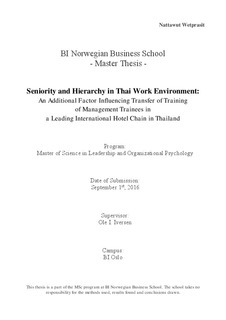| dc.description.abstract | With attention to the amount of money and other resources that company invests in training and developing its people, only minimal attention is, however, given to ensure that learned skills, knowledge and attitudes are transferred properly into actual workplace. In Thailand, a leading international hotel chain offers a management trainee program to develop local young talents and provide accelerating career path. This program, therefore, attracts cream of the crops from top universities in Thailand and Thai graduates abroad to join an 18-month program. Although the number of the management trainees hired are increasing, the number of trainees graduated from this program is decreasing. Many quitted the program during or after the training. In fact, the program is well-structured so why did management trainees give up their commitments?
In spite of the internationalization and modernization of the company, work environment still features unique local culture. In this case, seniority and hierarchy are highly valued and practiced in professional setting. Junior leaders can hardly lead or drive change over senior colleagues. This research consequently explores how seniority and hierarchy in Thai work environment affect transfer of training of the management trainee program by employing generic qualitative analysis as the research method to collect and analyze data from twenty-two individual interviews. Of which number, fourteen are management trainees, four are human resources directors and four are general managers or coaches of the management trainees. Researcher investigates four main factors affecting work environment which are opportunity to perform, transfer climate, social support and follow-up.
The results ratify that seniority and hierarchy are strongly present in Thai work environment. Transfer of training of management trainee program and three additional work-environment factors namely opportunity to perform, social support and transfer climate are relatedly influenced. Whereupon, the consequences are job dissatisfaction and eventually, resignation from the program. On the bright side, job satisfaction and loyalty are enjoyed by those management trainees who successfully adapt to this work culture. With all findings considered, researcher constructively presents a discussion and suggestions for the company to improve the program and its effectiveness. | nb_NO |
